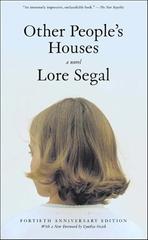 Lore Segal, "a virtuosic and witty author of autobiographical novels of her life as a young Jewish Viennese refugee in England and as an émigré in America," died October 7 at age 96, the New York Times reported. In 1938, she was one of 500 Jewish children who boarded a train in Vienna as part of the British-organized Kindertransport, and would live with four families over seven years. Her parents followed her in 1939, entering the country on domestic servant visas. Segal eventually settled in New York, where "she found her métier by telling tales of her exile."
Lore Segal, "a virtuosic and witty author of autobiographical novels of her life as a young Jewish Viennese refugee in England and as an émigré in America," died October 7 at age 96, the New York Times reported. In 1938, she was one of 500 Jewish children who boarded a train in Vienna as part of the British-organized Kindertransport, and would live with four families over seven years. Her parents followed her in 1939, entering the country on domestic servant visas. Segal eventually settled in New York, where "she found her métier by telling tales of her exile."
Segal worked as a clerk, a secretary, and a textile designer, taking night classes at the New School. In 1961, she married David Segal, who was then working in his father's textile company, but went on to be an editor at Knopf.
Other People's Houses, her memoir-disguised-as-a-novel, first appeared in serial form in the New Yorker before it was published as a book in 1964. She became a regular contributor to the magazine.
The book established Segal's place in the city's literary ecosystem, and "she went on to skewer, uproariously, the chattering, questing, anxious tribe in which she found herself. Lucinella (1976), a fantasy-satire, took on Yaddo, the writer's retreat in upstate New York, of which she was an alumna, among other familiar settings," the Times wrote. Her 2007 novel Shakespeare's Kitchen was a finalist for the Pulitzer Prize in fiction.
"I want to write about the stuff--in the midst of all the stew of being a human being--that is permanent, where Adam and Eve and I would have had the same experiences. I really am less interested in the social change," Segal told the Associated Press in 2011.
In Her First American (1985), Segal wrote about a young European Jewish refugee and her love affair with a charismatic and catastrophically alcoholic middle-aged Black intellectual, inspired by her own five-year relationship with Horace R. Cayton, a Black sociologist who died in 1970.
The book took 18 years to write. "I knew my Horace, I knew my Carter Bayoux, and I was raring to go," Segal said in a 2022 interview. "But I had no idea how to make a character out of the Ilka person. I settled on making her a newcomer and a naïf because I wanted to trace her Americanization and her growing sophistication by the use of her language."
Segal taught creative writing at Columbia, Princeton, Sarah Lawrence College, Bennington, Ohio State University, and the University of Illinois Chicago, to which she commuted from New York City for 14 years. Her fifth novel, Half the Kingdom, was published in 2013. She was also a prolific children's book author and a translator of the Bible and of Grimm's fairy tales, which she adapted into contemporary English in a collaboration with Maurice Sendak, titled The Juniper Tree (1973).
Melville House published Segal's books for the latter part of her career, including her last novel, Half the Kingdom; the novella Lucinella; an anthology collecting her fiction and nonfiction, The Journal I Did Not Keep; and her final book, the story collection Ladies Lunch.
Valerie Merians, Segal's editor at Melville House, said, "Lore was a woman of great charm and curiosity--about others, about all of life. Even at the end. Everything interested her. As she would say, 'Everything is copy.' And you can see it in her writing--so alive with inquiry and compassion. How wonderful that we have her brilliant work to visit with, though she herself is gone."

